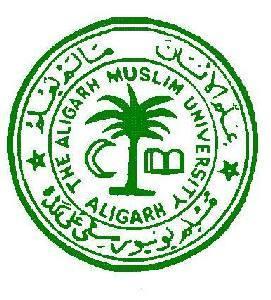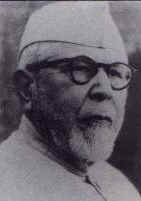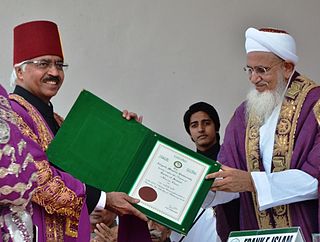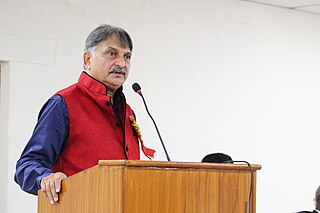
Wilhelm Siegmund Feldberg was a German-British physiologist and biologist.

Hakim Syed Zillur Rahman is an Indian scholar of Unani medicine. He founded Ibn Sina Academy of Medieval Medicine and Sciences in 2000. He had earlier served as Professor and chairman, Department of Ilmul Advia at the Ajmal Khan Tibbiya College, Aligarh Muslim University, Aligarh, for over 40 years before retiring as Dean Faculty of Unani Medicine. Presently, he is serving AMU as "Honorary Treasurer". In 2006, the Government of India awarded him the Padma Shri for his contribution to Unani Medicine.

Jawaharlal Nehru Medical College, Ajmer is a government medical college located in Ajmer (Rajasthan), India. Established in 1965, it is one of six government-run medical colleges in the western state of Rajasthan, and the fourth to be established in the state. It is affiliated with RUHS, and provides education leading to the Bachelor of Medicine, Bachelor of Surgery (MBBS) degree and the MS/MD/DM degrees. It also offers diplomas and other degrees in medical disciplines. Before the establishment of RUHS, in 2005, it was affiliated with Rajasthan University. It publishes the Ajaymeru Journal of Medical Education and Research (AJMER).

Jawaharlal Nehru Medical College is the constituent medical college of Aligarh Muslim University, located in Aligarh, in the Indian state of Uttar Pradesh.
Syedna Tahir Saifuddin School, better known by its initials STS School, and by its former name Minto Circle, is a K–12 semi-residential high school under Aligarh Muslim University at Aligarh, Uttar Pradesh, India. Established by Sir Syed Ahmad Khan as Muhammadan Anglo-Oriental Collegiate School in 1875, it later evolved as Aligarh Muslim University and is one of the five senior secondary schools run by the university.

Mohammad Habib (1895–1971) was an Indian historian, who worked at the Aligarh Muslim University. He was involved in the Indian Independence movement, and was an associate of both Gandhi and Jawaharlal Nehru.

Ibn Sina Academy of Medieval Medicine and Sciences (IAMMS) is a trust registered under the Indian Trusts Act, 1882. Mohammad Hamid Ansari, former vice-chancellor of Aligarh Muslim University, Aligarh, formally inaugurated it on 21 April 2001. Department of AYUSH, Ministry of Health and Family Welfare, Government of India gave accreditation to the academy in 2004 and promoted it as 'centre of excellence' in 2008. Membership of the academy is open to anyone who has an interest in the academy's activities particularly on history of medicine and history of science. Being a charitable organization, donations to the Academy are also exempted from Income Tax under section 80G of the Income Tax Act 1961.

Syed Ziaur Rahman is a permanent member of 'Board of Trustees' and Chair of the Advisory Council, International Association of Medical Colleges (IAOMC). He also serves as elected secretary of IAOMC and Society of Pharmacovigilance, India (SoPI).
Prem Narain Saxena was the Founder Professor and Chairman of the Department of Pharmacology, Jawaharlal Nehru Medical College, India. He made several notable contributions to the fields of traditional medicine and neuropharmacology. His demonstration of the wound-healing property of Curcuma longa was a major contributor to India's successful challenge of the US patent on the wound-healing property of Haldi. He was intimately involved in discovery and pre-clinical development of the non-barbiturate hypnotic Methaqualone. His basic studies have helped in understanding the role of various neurotransmitters in thermoregulation. He also standardized the use of Setaria cervi for discovery of new anti-filarial agents.

Abdul Majeed Khwaja was an Indian lawyer, educationist, social reformer and freedom fighter from Aligarh. In 1920, he along with others founded Jamia Millia Islamia and later served its vice chancellor and chancellor.
Mahdi Hasan was an anatomist from Uttar Pradesh, India.
The Society of Pharmacovigilance, India (SoPI), is an Indian national non-profit scientific organisation, which aims at organizing training programmes and providing expertise in pharmacovigilance and enhance all aspects of the safe and proper use of medicines

Aligarh Muslim University is a public central university in Aligarh, Uttar Pradesh, India, which was originally established by Sir Syed Ahmad Khan as the Muhammadan Anglo-Oriental College in 1875. Muhammadan Anglo-Oriental College became Aligarh Muslim University in 1920, following the Aligarh Muslim University Act. It has three off-campus centres in AMU Malappuram Campus (Kerala), AMU Murshidabad Centre, and Kishanganj Centre (Bihar). The university offers more than 300 courses in traditional and modern branches of education, and is an institute of national importance as declared under seventh schedule of the Constitution of India at its commencement.

Dr Ashok Seth,born on 12th October 1954 is an Indian interventional cardiologist, credited with the performance of over 50,000 angiograms and 20,000 angioplasties, which has been included in the Limca Book of Records, a reference book for achievements and records from an Indian perspective. He is a Fellow of the Royal Colleges of Physicians of London, Edinburgh and Ireland and serves as the chief cardiologist, holding the chairs of the department of cardiovascular sciences and cardiology council at the Fortis Healthcare. Seth, a recipient of the Order of Isabella the Catholic, was honored by the Government of India with the fourth highest Indian civilian award of Padma Shri, in 2003, followed by Padma Bhushan, the third highest Indian civilian award, in 2015.
Asis Datta is an Indian biochemist, molecular biologist and genetic engineer, known for his research on genetically modified foods and food nutritional security. He was the founding Director of the National Institute of Plant Genome Research and is credited with the discovery of genes that assist in extended preservation of fruits and vegetables. He is a recipient of the Shanti Swarup Bhatnagar Award, the highest Indian award and in the Science category, and was awarded the fourth highest civilian award of the Padma Shri, by the Government of India, in 1999. In 2008, he was included again in the Republic Day Honours list for the third highest civilian honour of the Padma Bhushan.
Om Datt Gulati (1927–2012) was an Indian pharmacologist and the Dean of the Department of pharmacology at Baroda Medical College. Known for his researches in autonomic pharmacology, he was also a professor at Pramukhswami Medical College, Anand and an honorary fellow of the Indian Pharmaceutical Society. The Council of Scientific and Industrial Research, the apex agency of the Government of India for scientific research, awarded him the Shanti Swarup Bhatnagar Prize for Science and Technology, one of the highest Indian science awards for his contributions to Medical Sciences in 1971. He received B. C. Roy Award, the highest Indian medical award, in 1981.

Birendra Nath Mallick is an Indian neurobiologist and a professor of neurobiology at the School of Life Sciences of Jawaharlal Nehru University. Known for his research on the Neuroscience of sleep, Mallick has authored and edited articles and in the first monograph on REM Sleep. He is a J. C. Bose National Fellow of the Department of Biotechnology and an elected fellow of all the three major Indian science academies viz. National Academy of Sciences, India, Indian Academy of Sciences, and Indian National Science Academy.
Asad Ullah Khan is an Indian microbiologist, biochemist and a professor at the Interdisciplinary Biotechnology Unit of the Aligarh Muslim University. He is known for his studies on multidrug resistant clinical strains as well as for the first sighting in India of Aligarh super bug (NDM-4), a variant of New Delhi metallo-beta-lactamase 1 (NDM-1). He is an elected fellow of the Royal Society of Chemistry, the Biotech Research Society, India and the Indian Academy of Microbiological Sciences. The Department of Biotechnology of the Government of India awarded him the National Bioscience Award for Career Development, one of the highest Indian science awards, for his contributions to biosciences, in 2012.

Shakeel Ahmed Samdani was an Indian academic scholar who served as the Dean of the Faculty of Law at Aligarh Muslim University. He was an alumnus of the Deen Dayal Upadhyay Gorakhpur University and the Aligarh Muslim University. He established Sir Syed Awareness Forum and served as its director. He was a member of the All India Muslim Personal Law Board and authored books including Uniform Civil Code: Problems and Prospects, Maintenance of Muslim Divorcee and Understanding Human Rights and Law.
Manindra Nath Ghosh was an Indian pharmacologist who was the first director of Jawaharlal Institute of Postgraduate Medical Education & Research (JIPMER) in Puducherry, India.












